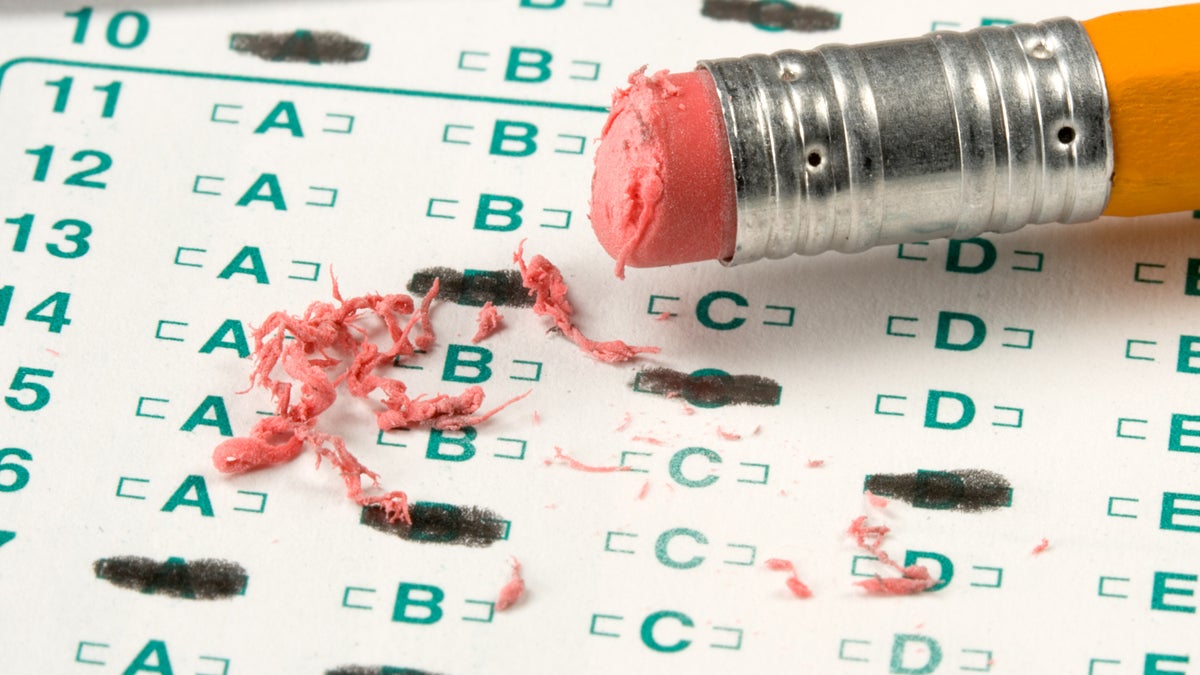Passing Pa.’s standardized test to graduate from high school derided as ‘unfunded mandate’
 Photo via ShutterStock) " title="ssstandardizedtestsx1200" width="1" height="1"/>
Photo via ShutterStock) " title="ssstandardizedtestsx1200" width="1" height="1"/>
(Photo via ShutterStock)
State Sen. Andrew Dinniman, (D-Chester County), introduced legislation in Harrisburg Wednesday that would exempt Pennsylvania high school students from having to pass standardized tests to graduate.
Starting with the class of 2017, Pennsylvania law dictates that students must show proficiency on Keystone standardized tests in Algebra I, Biology and Language Arts before earning diplomas.
Dinniman said recent state cuts to classroom education budgets make this requirement an “unfunded mandate” that will simply “stamp failure” on many students coming from impoverished school districts.
Dinniman’s proposal, S.B. 1382, would leave graduation requirements up to individual districts.
“If a student is staying in school against the odds — and in very difficult situations with a lot of peer pressure to leave — how is this going to help?” Dinniman asked. “This is going to increase the student dropout rate.”
This year’s 9th graders are the first to face the graduation requirement. Students can take the pass/fail tests at any point in their high school careers, up to three times each. If students still haven’t passed, they can prove competency by completing a project assessment to be judged by the Pennsylvania Department of Education.
Parents wishing to opt their students out of testing can choose the project assessment at the outset.
Dinniman surveyed superintendents and said he believes more than 100,000 of the state’s 830,000 high school school students will likely end up taking the project assessment. Between paying for this, test preparations and the state-mandated remediation for students who fail, Dinniman calculated the endeavour will end up costing districts an additional $300 million in total.
“The department of education isn’t ready [for this],” said Dinniman. “There’s no conceivable way that with this number of students that they’re going to be able to process these project assessments.”
In the past, the state’s acting secretary of education Carolyn Dumaresq, has disagreed with Dinniman about these costs. The calls to the department seeking comment for this story were not returned.
Under the law, school superintendents can automatically exempt 10 percent of their students from the testing requirement, and can exempt students beyond that if granted state approval.
With this fail-safe included, Dinniman characterizes the requirement as “a farce” that will occupy “undue amounts of hours, focusing on testing and taking away from teaching.”
Empty diplomas
Donna Cooper, executive director of Public Citizens for Children and Youth, advocated for testing requirements as a member of former Governor Ed Rendell’s cabinet.
She agreed with Dinniman logic, if only in part.
“Under the current conditions, having the Keystone exams as a requirement of graduation is a very unfair situation”‘ she said, “but I think the answer is not to remove the Keystone exams, but to find the money so that the kids can get prepared.”
Cooper estimates that the state education budget needs to be increased by $2 billion in order to provide students in all of Pennsylvania’s 500 school districts with the resources they need to pass the tests.
Once higher funding levels are in place, Cooper stressed the importance of aligning those dollars with accountability measures that are consistent from district to district.
Right now, she said, the rigor of high school graduation requirements vary wildly across the state, and many students are handed “empty diplomas.”
“Those kids are just not entering the economy as well prepared as kids that are going to school districts with more rigor,” she said.
Cooper argues that implementing more stringent high school graduation standards will also help ameliorate the rising costs of higher education.
“A very large share of Pennsylvania students are entering college — both community college and traditional four year colleges — requiring remediation,” she said. “Unfortunately for the students, the remediation courses are not credit-bearing. So they’re using college loans to pay for non-credit-bearing courses to teach them the skills they needed to learn in grades K-12.”
The rates of Pennsylvania students scoring highly on the SAT pale in comparison, Cooper said, to those in New Jersey and New York — states where standardized exams have long been the norm.
Dinniman called Cooper’s position “wishful thinking” that will “hurt so many children” in the long run.
“There is no more money. Those who say, ‘well let’s get more money for the schools.’ There is no more money,” he stressed. “The state is going to be in debt $1.2 billion dollars from this year alone, and so where is this money going to come from?”
He called the testing requirement “phony accountability.”
“This idea that the tests are going to change everything is absurd. How does the test change the fact that a student in Philadelphia is sitting in a classroom of 45 students with no lab experience, no specimens and not adequate textbooks?”
Even with increased funding, Dinniman opposes standardized testing as a graduation requirement.
He worries schools will end up cutting more elective courses, art and music programs in order to focus on the three tested subjects.
So what should graduating high school in Pennsylvania actually mean?
“It means different things for different students,” said Dinniman. “For some students it means that they have performed at the top of the curriculum. For other students it means that they have given it their best, they’ve stayed the 12 years out of a commitment to learn.
“I don’t think that’s much different from what’s happened in high schools since the beginning of secondary education in the United States. The answer is to try to help the student when they need the help.”
Instead of spending millions on testing, he’d devote that money to early childhood education.
Dinniman’s proposal will now be referred to the education committee, where he is the minority chairman. It will be up to majority chairman Mike Folmer, (R-Lebanon County) to bring it up for committee vote. Folmer could not be reached for comment.
“It’s an important issue, and senators will be eager to hear from constituents regarding the specific language in the bill,” said a spokesman for Senate Majority Leader Dominic Pileggi (R-Delaware County).
Dinniman previously introduced a bill that reduced the graduation requirement testing from five exams to the current three. The bill won the support of the education committee. Before being voted on by the full senate, the Corbett administration unilaterally made the change itself – axing tests in English composition and civics.
PCCY’s Cooper called the chances of Dinniman’s new bill passing the legislature “a long shot.”
WHYY is your source for fact-based, in-depth journalism and information. As a nonprofit organization, we rely on financial support from readers like you. Please give today.





